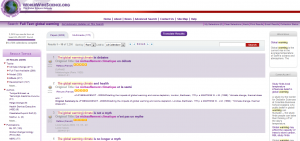Jun
[ Editor's note: This article was first published in the Deep Web Technologies Blog. ]
WorldWideScience is a global science gateway that combines national and international scientific databases into a search engine. From a single search form, a scientist, researcher, or curious citizen can search over fifty databases in English and now 22 multilingual sources (with translation to the searcher’s native language) and seven multimedia sources. WorldWideScience is the brainchild of the director of the DOE Office of Scientific and Technical Information (OSTI), Dr. Walt Warnick. The gateway is maintained and hosted by OSTI and governed by the WorldWideScience Alliance.
From a single search form, a scientist, researcher, or curious citizen can search over fifty databases in English and now 22 multilingual sources (with translation to the searcher’s native language) and seven multimedia sources. WorldWideScience is the brainchild of the director of the DOE Office of Scientific and Technical Information (OSTI), Dr. Walt Warnick. The gateway is maintained and hosted by OSTI and governed by the WorldWideScience Alliance.
Deep Web Technologies is proud to have developed the federated search technology behind WorldWideScience. And, with the cooperation of the Microsoft Translation services team, Deep Web Technologies also implemented the multilingual technology. It was a major undertaking but a worthwhile one for the science community, whose members can now greatly expand their reach to scientific papers in languages beyond their own.
Dr. Warnick was invited to deliver a presentation at the 14th session of the United Nations’ Commission on Science and Technology (CSTD). In a post at the OSTI Blog, Dr. Warnick shares the warm reception that WorldWideScience received.
I wish more of my OSTI colleagues could have been in Geneva to share the warm response from the attendees. Several country representatives offered up new sources for WorldWideScience (WWS). Another member of the audience searched mobile WWS for his own name and remarked that he found many of his papers. I received enthusiastic comments, so many that I couldn?t address all of them because of time constraints. Significantly, the Chair of CSTD volunteered to pay the costs of becoming a member of the WorldWideScience Alliance. There was great excitement about the possibilities for its use within the home countries of the attendees and how WWS advances the goals of CSTD.
The paper “Breaking down language barriers through multilingual federated search” co-authored by Abe Lederman (founder and president of Deep Web Technologies), and Dr. Warnick, Brian Hitson, and Lorrie Johnson from OSTI, explains the importance of the gateway:
“WorldWideScience.org (WWS) is a global science gateway developed by the US Department of Energy Office of Scientific and Technical Information (OSTI) in partnership with federated search vendor Deep Web Technologies. WWS provides a simultaneous live search of 69 databases from government and government-sanctioned organizations from 66 participating nations. The WWS portal plays a leading role in bringing together the world’s scientists to accelerate the discoveries needed to solve the planet’s most pressing problems. In this paper we present a brief history of the development of WWS and discuss how a new technology, multilingual federated search, greatly increases WWS’ ability to facilitate the advancement of science.”
Deep Web Technologies is delighted to be working with OSTI and other organizations to push the envelope of search technology and to make the world a smaller place.

